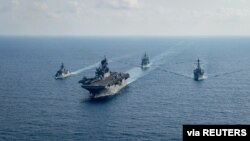First-time U.S. sanctions against a group of Chinese companies believed to have helped China fortify disputed islets in an Asian sea signal a tougher policy by Washington toward its rival superpower’s maritime expansion, analysts say.
The Bureau of Industry and Security under the U.S. Department of Commerce added 24 Chinese companies to a list that the bureau uses to restrict exports, re-exports and in-country transfers of items that could flout national security or foreign policy interests.
Companies landed on the list because they helped the Chinese military “construct and militarize the internationally condemned artificial islands in the South China Sea,” the department said in an August 26 statement. Those islets, many built on reclaimed land, now support hangars, radar facilities and small civilian populations.
The sanctions won’t hurt the target companies but show the United States is toughening its stance, long term, toward Chinese expansion in the South China Sea, said Andrew Yang, secretary-general of the Chinese Council of Advanced Policy Studies think tank in Taiwan.
Washington does not claim any of the 3.5 million-square-kilometer sea but wants it kept open for international use. Brunei, Malaysia, the Philippines, Taiwan and Vietnam dispute all or part of China’s claims to about 90% of the waterway, which is valued for fisheries and energy reserves. Expansion of the islets contributed to China’s military lead over the other governments.
“It’s quite symbolic,” Yang said. “I think the [business] impact is insignificant as far as I can see. It’s really symbolizing that the United States is shifting its South China Sea policy significantly.”
The sanctions stem from U.S. Secretary of State Michael Pompeo’s statement in July, said Oh Ei Sun, senior fellow with the Singapore Institute of International Affairs. Pompeo said then most Chinese claims to the sea are illegal and that Washington would support other states that clash with China.
The Chinese foreign ministry condemned the sanctions August 27 and “urged the United States to rectify its mistakes and immediately stop interfering in China's internal affairs,” the official Xinhua News Agency said, citing a foreign ministry spokesperson.
But scholars foresee virtually no business impact. The sanctioned companies including state-run giants China Communication Construction Co. and China Electronics Technology Group Corp. do little business in the United States. They are considered popular instead in Southeast Asia, even among China's maritime rivals.
“I think all these companies, they are still happily engaging as contractors for construction projects, say in Malaysia and the Philippines as well,” Oh said. “It’s just that they are cheap and fast. Therefore, they are widely used.”
China invests briskly in Southeast Asia, in some cases to keep maritime disputes from flaring up.
China Communications Construction Co and a Philippine partner won a bid last year to develop a $10 billion airport outside Manila, for example. The Philippine government won international arbitration against China four years ago. Since then Beijing has offered Manila billions of dollars in aid and investment.
“State had to do something to show that they were serious,” said Gregory Poling, director of the Asia Maritime Transparency Initiative under the Center for Strategic and International Studies research organization in Washington.
Target companies can handily avoid actual sanctions, Poling added, while Washington missed listing other Chinese firms that are still active in the disputed sea. None of the targeted 24 companies are building islets anymore, he said, as China’s island dredging ended four years ago, and construction stopped two years ago.
The sanctions spared China's offshore oil firms, which irritate Vietnam by operating in contested parts of the sea.
Sanctions, Poling said, are “not going to assuage the concerns in the region by itself because it doesn’t really hurt the companies involved and it targets the wrong companies to begin with.”







